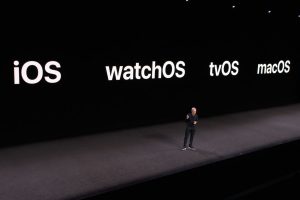Investor expectations going into Apple's annual product event earlier this month were subdued. Few industry watchers expected major changes to the company's products to be announced--and they were proven correct. All of the newly-announced iterations of Apple's iPhone featured incremental improvements rather than any groundbreaking technological changes.
However, while Apple may be a hardware company first and foremost, investor focus on new hardware products misses what could be the company's catalyst for future growth: its consumer-facing SaaS platform, otherwise known as the operating systems its devices use. That includes iOS, MacOS, tvOS and WatchOS.
What exactly makes Apple's operating systems a potent SaaS platform on their own--rather than just the free software included on the company's "real" products? First, Apple's installed base is enormous. The company currently counts 1.4 billion active devices, and each and every one uses one of Apple's operating systems. That gives all of their devices and their users direct access to Apple's services as well as the third-party services that the company takes a cut from.
Second, paid subscriptions are soaring, highlighting the fact that Apple is effectively monetizing this massive installed base. The company boasted 420 million paid subscription at the second of the second half of 2019, up from just 300 million a year earlier. That's an impressive growth of 40 percent year-over-year. What's more, Apple makes money both from subscriptions to its own services and to those offered by third parties; third-party subscriptions net Apple 30 percent of payments in year one and 15 percent every year thereafter
Lastly, Apple is currently in the middle of an aggressive launch of new paid subscription services. The company has announced four new services so far this year, two of which have already launched with the remaining two debuting over the next month. They include Apple News+, with a $9.99 monthly subscription fee; video game subscription service Apple Arcade, with a $4.99 monthly subscription fee; streaming TV service Apple TV+, with a $4.99 monthly subscription fee; and Apple's well-publicized branded credit card. These new services add to an already strong roster of services including the App Store, Apple Music, iCloud and Apple Care.
All of this is reflected in the fact that Apple's services revenue is growing quickly. From the second half of 2018 to the second half of this year, it experienced a 16 percent increase. In other words, while Apple's main business may still be hardware, investors should start paying more attention to Apple's services as the segment continues to grow in importance for the company.
























